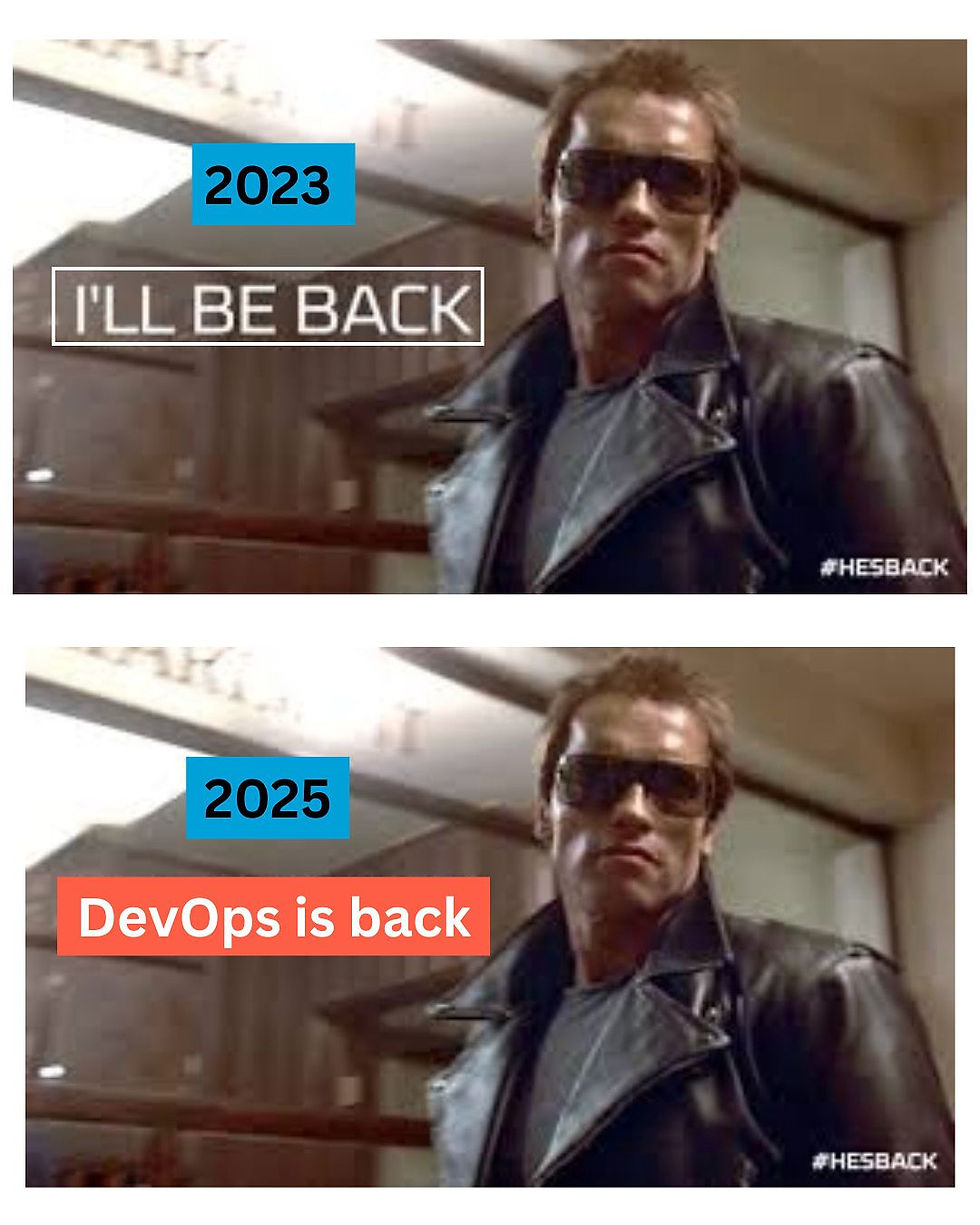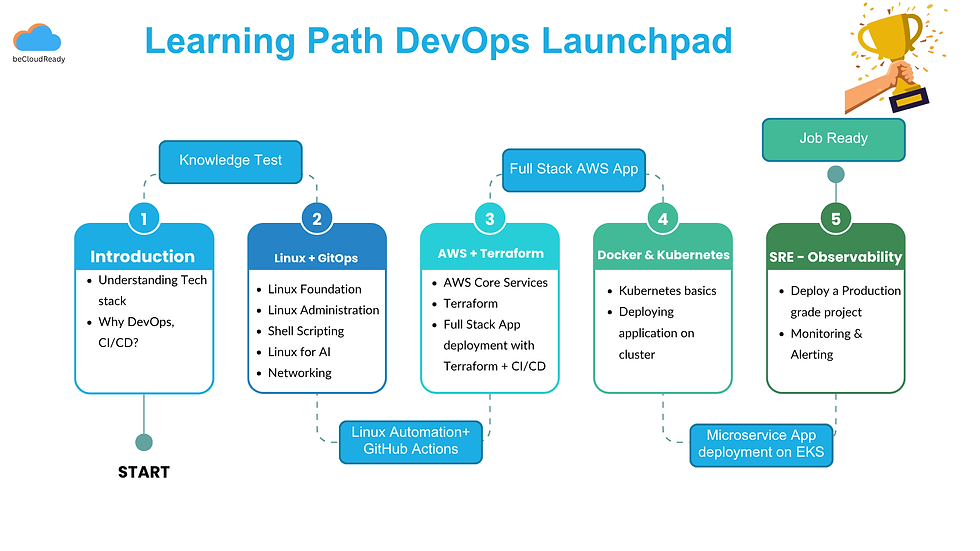DevOps Launchpad - Land a DevOps Job in 60 days
- Chandan Kumar

- Aug 3, 2025
- 4 min read

Why DevOps Jobs Are “True Survivors” — The Early Indicator of Tech Recovery and Resilience
In the whirlwind of tech industry layoffs from 2022 through mid-2024, DevOps roles have quietly proven themselves as the true survivors of the modern IT landscape. While high-profile cuts swept through mid-management, legacy IT, and even some engineering roles, the demand for skilled DevOps professionals showed remarkable resilience. In many cases, companies kept or even expanded their DevOps teams in order to maintain product velocity, reliability, and cost efficiency during uncertain times. This isn’t just anecdotal—analysts note that DevOps hiring dips less in recessions and picks up earlier than most tech functions when business confidence returns.
As the job market rebounds in late 2024 and into 2025, a clear trend is emerging: organizations restarting their growth engines are first rebuilding their DevOps teams. This is an unmistakable signal that the tech sector has shifted from defense to offense—businesses are stepping up investments in automation, cloud migration, and continuous delivery to accelerate product development and scale operations. Historically, surging DevOps hiring correlates with a broader rebound in tech growth and innovation.
DevOps roles are unique in their resilience—essential in recessionary cutbacks for maintaining operational efficiency, and even more essential during boom times to help teams move faster, deploy frequently, and outcompete rivals. For anyone considering a career pivot or upskilling, DevOps offers both stability and exceptional opportunity for impact—making now one of the best times in years to join the field.
A Roadmap Tailored for Job-Ready DevOps Engineers
The DevOps Launchpad is an intensive, project-driven 5-week program built around the skills and experiences most valued by today’s employers. Here’s how each module gives you a direct advantage in the job market:

Week 1: Linux, Docker, GitHub Actions
Foundation in Linux: Mastering Linux, shell scripting, and file systems is table stakes for DevOps roles—almost every DevOps job description lists Linux proficiency as essential1.
Automation and CI/CD: Hands-on with Git, GitHub, and Docker, you’ll learn to automate builds, manage version control, and set up CI/CD pipelines from day one—a major requirement for modern DevOps and platform engineering jobs1.
Project Demo: You’ll showcase your skills by Dockerizing and deploying real applications, giving you portfolio projects that distinguish you from candidates with only theoretical experience.
Week 2: AWS Core Services – EC2, S3, VPC
Direct Cloud Experience: 85% of organizations use multi-cloud, but AWS remains the market leader—even in entry-level roles, practical AWS experience sets you apart1.
Networking & Security: Understanding VPCs, subnets, and IAM not only prepares you for technical interviews but also for real-world tasks you’ll face on the job1.
Week 3: Terraform & Extended AWS Services
Infrastructure as Code (IaC): Mastering tools like Terraform is now a baseline expectation for DevOps engineers—employers are actively seeking candidates who can automate and reproduce entire environments1.
Production Scenarios: Projects with EC2, S3, RDS, auto-scaling, and CloudWatch monitoring build end-to-end competency—vital for troubleshooting and scaling modern applications.
Week 4: Kubernetes with EKS
Container Orchestration: Kubernetes, especially managed solutions like EKS, is among the fastest growing DevOps skills—platform engineering and cloud-native deployments are crucial resume boosters.
Advanced Deployments: By deploying production-grade apps (with autoscaling, ingress controllers, and monitoring), you prove your ability to handle real cloud workloads that employers value.
Week 5: Full-System Capstone Project
Complete Architecture Showcase: Building a multi-tier, cloud-native system incorporating AWS, Kubernetes, Kafka, PostgreSQL, Redis, and MongoDB, you leave with a comprehensive portfolio project—demonstrating not just tools, but how you architect and deliver a complete solution1.
Portfolio That Gets Interviews: Capstone projects substantiate your ability to solve problems and deliver real systems, which is exactly what employers look for in technical screenings and interviews.
Why This Curriculum Leads to Real Jobs
Alignment with Industry Demand: All modules map directly to in-demand DevOps roles—from AWS DevOps engineers to platform and automation engineers. AWS, IaC, CI/CD, and Kubernetes consistently top skill requirements in job postings21.
Certifications and Practical References: The program supports certification prep (like AWS DevOps Engineer) and includes demo days and instructor references—adding immediate credibility to your job applications1.
Hands-On, Instructor-Led: With a blend of live remote lectures, Q&A, and heavy use of AI tools (ChatGPT, Copilot), you learn by doing—not just by listening—mirroring the workplace environment1.
Job Placement Focus: The program structure, resume support, and capstone demo are tailored to help participants stand out in job applications and technical interviews, with post-training placement assistance and a partner network already in place
The Bottom Line
The DevOps Launchpad is more than a training program—it’s a direct transition to the workplace. By moving from Linux and automation basics through advanced AWS, Terraform, and Kubernetes projects, then wrapping up with a portfolio-ready capstone, you’re not just learning—you’re building the exact experience that gets you interviews and offers in the current DevOps market, whether you’re targeting entry-level, mid-level, or even a pivot to architect roles.
If you want a direct, project-driven pathway to a DevOps job—backed by industry alignment and real placement support—this curriculum is built for you.




Comments